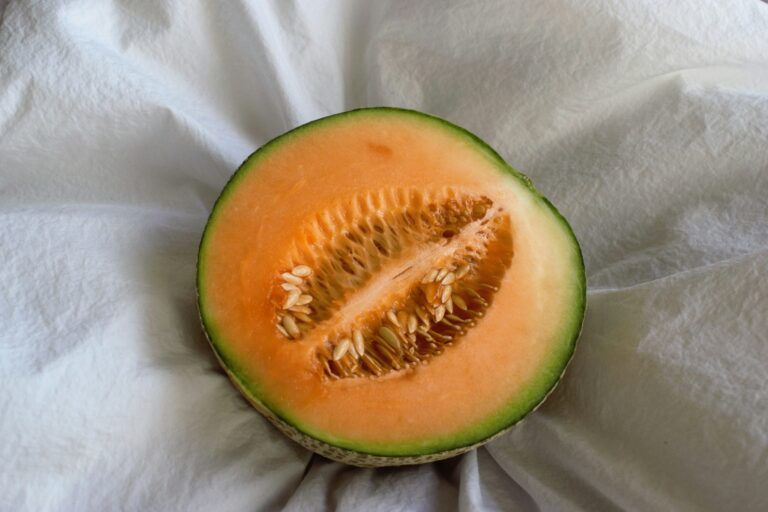The scientific name of broccoli is Brassica oleracea italica, which is native to the Mediterranean. Its English name broccoli, is derived from the Italian word broccolo, which means “the flowering crest of a cabbage”. Broccoli is essentially a large edible flower. The stalk and flowers are eaten both raw and cooked.
Size: size varies with varieties 4 to 6 inches in diameter or even larger.
Color: fresh broccoli usually dark green in color. Dark or bright green to purplish color with closed flower buds.
Flavor: very crunchy with a vegetal, slightly sweet, and slightly bitter flavor. It differs greatly in flavor from cooked broccoli.
Shape: head shaped like cauliflower but consisting of many tiny flower buds.
Nutrients
Broccoli contains almost 90% of water, the rest are carbohydrates, proteins, and almost no fat. These nutrients have health benefits and prevent you from many diseases. These are the following nutrients contained in 100 gm of broccoli
- Proteins 2.32 g
- Carbohydrates 3.95 g
- Energy 21.84
- Sugar 1.08
- Fiber total dietary 2.57 g
- Fat= 0.4 g
| How to grow Broccoli? |
Healthy Benefits of Broccoli
Like other plant foods, broccoli is also considered healthy food
Lower cholesterol level
Cholesterol has many important functions in your body. The key factor in the formation of bile acids, which help you digest fat. Bile acids are formed in your liver, stored in the gallbladder, and released into your digestive system. Afterwards, whenever you eat fat the bile acids are absorbed into your bloodstream and used again.
Substances in broccoli bind with bile acids in the gut, increasing the excretion and preventing them from being reused.
Thyroid problems
Broccoli is considered a goitrogen, which means that a high amount may harm the thyroid gland in sensitive individuals. Cooking this vegetable on high heat can reduce these effects. Broccoli is one of them which is also low in uric acid.
Support heart health
Recent studies showed that broccoli may support heart health. Broccoli plays a role in improving cholesterol and triglyceride levels which are known to be a major risk factor for heart diseases. In addition, a higher intake of fiber-rich foods like broccoli may be linked with a reduced risk of heart disease.
Eye Health
Broccoli contains beta carotene, which your body converts into vitamin A. Vitamin A deficiency may cause night blindness, which can be reversed with improved vitamin A. Impaired eyesight is a common consequence of aging. lutein and zeaxanthin, are associated with a decreased risk of age-related eye disorders.
Cancer Prevention
Broccoli is loaded with compounds that are believed to protect against cancer including lung, colorectal, breast, prostate pancreatic, and gastric cancer. Isothiocyanates, a unique family of plant compounds affect liver enzymes, reduce oxidative stress, decrease inflammation, stimulate your immune system, and combat the development and growth of cancer.
Support brain health
The nutrients and bioactive compounds present in broccoli may aids in healthy brain and nervous tissues function. It also lowers mental decline. Sulforaphane is another potent bioactive compound that helps support brain functions after an event of reduced oxygenation to the brain.
Blood thinner
Individuals taking the blood thinner should consult with their healthcare practitioner before increasing their broccoli intake because its high vitamin K content may be direct with these medications. Decent source of fiber and higher in protein than most other vegetables.
Aid blood sugar control
A human study showed significantly decreased insulin resistance in type 2 diabetes when consumed broccoli daily for one month. A good source of fiber and a higher intake of dietary fiber is associated with lower blood sugar and improved diabetic control.
Reduce constipation
A broccoli diet reduced levels of inflammation in the colon, as well as favorable changes in gut bacteria. Rich in fiber and antioxidants, both of which may support healthy bowel functions and digestive health.
Support a healthy immune system
Vitamin C is the most essential nutrient for immune function and broccoli is an excellent source of vitamin C which serves as a master regulator of the body’s overall antioxidant response. Cooked broccoli boosts 84% of the RDI for this vitamin.
Side Effects of Broccoli
Broccoli may cause digestive distress, particularly in people with irritable bowel syndrome. This is due to high fiber. Excessive taking of broccoli may cause excessive gas or bloating in some people. Broccoli contains some type of molecule named glucosinolates which may inhibit iodine uptake and thyroid hormone formation.
FAQ
What are the benefits of broccoli?
Broccoli contains almost 90% of water, the rest are carbohydrates, proteins, and almost no fat. These nutrients have health benefits and prevent you from many diseases. It aids blood sugar control, reduces constipation, supports brain, heart, and eye health, and is also good for your immune system.
Can we eat broccoli every day?
Yes, eating broccoli every day is acceptable. but keep in mind that moderation is crucial. The Recommended Daily Allowance for this nutrient is 90-108% of 90 grams of chopped raw broccoli for both men and women.
Where did broccoli come from?
Broccoli is native to the Mediterranean. Its English name broccoli, is derived from the Italian word broccolo, which means “the flowering crest of a cabbage”. Around 1720, broccoli was imported into England after being grown in Italy during the early Roman era.






